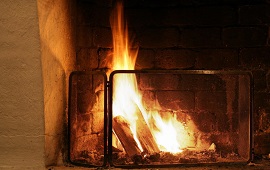As the temperatures drop, homeowners will start to more frequently use their heating equipment. Unfortunately, according to statistics from the National Fire Protection Association, heating equipment is a leading cause of home fire deaths, second only to cooking equipment, accounting for approximately 20% of all home fire deaths. Portable and stationary space heaters accounted for 81% of heating-related home fire deaths between 2007 and 2011. These startling statistics highlight the importance of staying safe while keeping warm. Fortunately, there are some basic safety tips to reduce your risk of being in danger.
Fireplaces:
A fireplace can be the heart of your home in winter. Many families find gathering around the fireplace to be a comfortable and relaxing way to spend their evenings. Unfortunately, a fireplace can also be a safety risk. To keep your fireplace safe, you should never leave a lit fire unattended, use flammable liquids to start a fire or burn garbage. Additionally, you should use metal mesh screening to prevent embers falling into the room and keep an eye on pets and children near the fireplace. You should also check that the area above your chimney is free of debris such as fallen leaves or overhanging branches.
Wood Stoves:
According to U.S Fire Administration data, wood stoves are the source of over 9,000 residential fires a year. Fortunately, you can prevent a wood stove fire in your home by burning only seasoned, dry wood. This type of fuel produces more heat and reduces the creosote buildup in your chimney, which is a major fire risk. You should ensure that any combustible materials including paper should be kept at least three feet from the stove, and you should avoid putting artificial logs or trash in your stove. You should also have your flue vents inspected and cleaned at least once per year and have smoke alarms installed and tested in your home.
Furnaces:
A furnace is an integral component of a central heating system and to ensure that your furnace operates safely throughout the winter, you should ensure that your furnace has adequate ventilation. There should also be a clear area around the furnace free of potentially combustible materials. It is recommended you have your furnace professionally inspected once a year and install carbon monoxide detectors if your furnace is gas fueled.
Electric Space Heaters:
Electric space heaters are a leading cause of home fires. The element inside the space heater can become hot enough to ignite combustible materials in the vicinity. You should only buy and use a space heater that has been evaluated by a nationally recognized laboratory. Your space heater should be unplugged when it is not in use, it should not be used in areas where it may be in contact with water, and should not be used to dry clothes. You should not store any items on top of your space heater and keep any combustible materials, at least, three feet away.
Kerosene Heaters:
You should check with your local fire department before you buy a kerosene heater. This type of heater may not be permitted for residential applications in your neighborhood. You will also need to check with your insurance provider, to check that any damage caused by a kerosene heater is covered in your homeowner policy. If you do use a kerosene heater, do not use any other type of fuel and ensure that you refuel the heater outdoors in a well-ventilated area.
